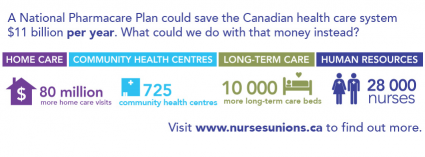New study released by CFNU illustrates Canada's need for national pharmacare program
A new study by a Carleton University School of Public Policy and Administration professor illustrates why Canada needs to develop a national pharmacare program.
Canada’s current hybrid prescription drug system is isn’t working, is unfair, inequitable and wastes vast amounts of money, says the report by Dr. Marc-André Gagnon.
The study, called A Roadmap to a Rational Pharmacare Policy in Canada, shows that Canadians pay among the highest per capita costs for prescription drugs, when compared to other OECD countries, the Canadian Federation of Nurses Unions said today in a news release.
As a result, one in 10 Canadians is unable to fill medical prescriptions because we pay among the highest costs for prescriptions, the report says. This places Canada among the countries with the most acute problem accessing prescription drugs.
“Our policymakers have all the necessary tools to assume leadership on this issue,” said CFNU President Linda Silas. “We urge them to act to protect all Canadians.”
The problem is that Canadian drug coverage is offered based on where a person works or lives, instead of accounting for their medical needs, the study shows.
Efforts to contain rising costs so far have only shifted costs elsewhere within the system, Dr. Gagnon’s study shows.
“We need to improve access for all Canadians,” CFNU said.
The study highlights four practical, achievable reforms that would improve Canadians’ access to prescription drugs:
1) Including prescription drugs in the public health care system
2) Establish a national “formulary” – an authoritative list of medications approved for prescribing
3) Systematic bulk purchasing of patented and generic drugs
4) National assessment of the safety and effectiveness of prescription drugs
Dr. Gagnon asserts that a universal pharmacare program could generate savings of 10 to 41 per cent on prescription drugs for the Canadian public health care system, representing savings of up to $11.4 billion per year, while simultaneously improving health outcomes.
A recent EKOS survey showed that 78 per cent of Canadians favour establishing a universal pharmacare program in Canada.

